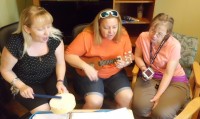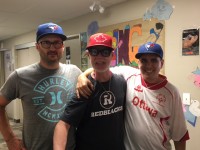Ukulele Sing Along With France

‘Music is such a wonderful, rewarding therapy for residents’
One day last winter when France Jalbert was visiting Forest Hill, she decided to play a ukulele to see how the residents she works with would react. They loved it.
Jalbert is an outreach worker for Total Communication Environment (TCE), a nonprofit organization providing supports and services to people with multiple disabilities and special communication needs living in long-term care homes and other settings.
She is often at the Kanata long-term care home working with residents who have special needs. On this particular day, life enrichment aide Shannon Lynch heard Jalbert playing the ukulele and saw the positive impact it was having on residents.
Lynch decided to bring some of the residents she works with to join Jalbert and the residents she works with to form a program, called Ukulele Sing Along with France.
Since then, Jalbert and Lynch have hosted the program twice per week.
“Music is such a wonderful, rewarding therapy for residents, so I asked France if she would consider teaming up to do a program and she said she would. It has really taken off from there,” Lynch tells The OMNIway.
Lynch brought a collection of old instruments tucked away in a storage area at the home and handed them out to residents. Residents used tambourines and other instruments to follow the rhythm of Jalbert’s ukulele.
Jalbert and Lynch say the music program benefits both residents with special needs and those who are living with cognitive impairment. Being able to express themselves through music also helps ease anxiety and agitation for residents, they say.
“(The music) captivates residents’ attention,” Jalbert says. “It’s a multisensory activity where everybody can participate. When (the residents) are playing along to music, they will be successful. The music will also sometimes bring out emotions they have that they can’t express.
“Everything about this program is positive.”
The program is even having a positive impact on staff members. Lynch says nurses and personal support workers sometimes stop by because they find the program is a stress reliever for them.
“People will often stop me in the hall and ask, ‘Is it music day?’ They get a lot of joy from this, too,” Lynch says.
If you have a story you would like to share with The OMNIway, please contact the newsroom at 1-800-294-0051, ext. 23, or e-mail deron(at)axiomnews.com.
If you have feedback on this story, please call the newsroom at 1-800-294-0051, ext. 23, or e-mail deron(at)axiomnews.com.
Ontario Wants To Hear From You
FOCUS GROUP PARTICIPANTS NEEDED
The Ministry of Community and Social Services is holding focus groups with individuals and families that take part in ministry-funded services and supports.
We want to better understand what things in life you would like developmental services to help you or your family member achieve.
Individuals and families who receive/take part in developmental services and supports are invited to participate in a focus group. Your feedback will have no impact on your services, and will be confidential and voluntary. Your individual responses or information will not be published.
The ministry values feedback from individuals and their families on their experiences and we recognize that ongoing engagement is key to making meaningful improvements to the developmental services system.
In mid-July focus groups will be held in:
London
Ottawa
Toronto
Thunder Bay
Video-conference for people living in remote and isolated areas
For specific dates and times of each focus group, please refer to the online registration form.
If you’re interested and you live within 100 kilometres of any of these locations, please reply to the ministry before Sunday July 3rd by completing an online registration form using this URL/link: http://fluidsurveys.com/s/DS_focusgroup_registration
Or you can call Darren Cyr in MCSS’ Policy Research and Analysis Branch (PRAB) at 416-314-4640.
We will send you the address and details when we follow-up to confirm your participation. Each focus group will last 1.5 - 2 hours. These focus groups are voluntary and will not affect the supports that individuals are currently receiving.
In appreciation for your time, you will receive a light meal, and we will cover transportation costs (e.g., public transit, taxi, mileage) and other eligible expenses (e.g., parking, personal support worker if needed) (receipts required).
Should you have any questions about these focus groups please contact Darren Cyr at the ministry at 416-314-4640 or email REU@ontario.ca
Developing Performance Measures for Adult Developmental Services | Questions and Answers for Individuals and Family Members/Caregivers
About the focus groups
Q1: Thanks for inviting me but what is a focus group?
A1: A focus group discussion is a good way to bring together people who have common experiences to discuss a specific topic. A facilitator asks questions and helps people in the group to participate in a discussion about those questions.
Q2: How long will the focus group take and who else will be there?
A2: Each focus group will last 1.5-2 hours. There will be anywhere from ten to 20 other people there. The focus groups for family members will be separate from the focus groups for individuals who are directly receiving services.
Q3: Where are the focus groups located?
A3: There will be ten focus groups across the province. Focus group locations include London, Ottawa, Toronto and Thunder Bay. A video-conference is also being planned to include individuals and families living in remote and isolated communities.
Q4: How are you selecting people for the focus groups?
A4: Service agencies and provincial associations/networks are sending out invitations on behalf of the ministry. From those who are interested and reply through an online form or by phone, the ministry will select a balance of participants across gender, age group, service types, living in urban and rural areas, and indigenous and Francophone communities (one session is designated for Francophone, should there be sufficient interest). The ministry will organize a video-conference for those living in isolated and remote communities.
Q5: Am I expected to talk about my personal experiences?
A5: No, rather the ministry wants to better understand what things in life you would like developmental services to help you or your family member achieve. However, the ministry values feedback from individuals and their families on their experiences and we recognize that ongoing engagement is key to making meaningful improvements to the system.
Q6: Will participating in a focus group have an impact on my services?
A6: No. Your participation will have no impact on your services.
Q7. What about my privacy? Will anyone be publishing what I say on the in a government report or on the Internet?
Only the people in the group will know your name. The ideas that you share will not be linked to your name so no one will know who said what.
Q7: What other groups is the Ministry consulting with?
A7: The Ministry is getting input and advice from DS agencies, Developmental Service Ontario (DSO) offices, and other stakeholders such as organizations for self-advocates and families. The ministry is working with a committee of these stakeholders to ensure all perspectives are included.
Q8: Who should I contact if I have additional questions?
A8: If you have any additional questions please contact Darren Cyr from the Policy Research and Analysis Branch at 416-314-4640 or REU@ontario.ca . The Policy Research and Analysis Branch of the Ministry of Community and Social Services is organizing the focus groups.





